7 Ways to Help Calm an Explosive Child
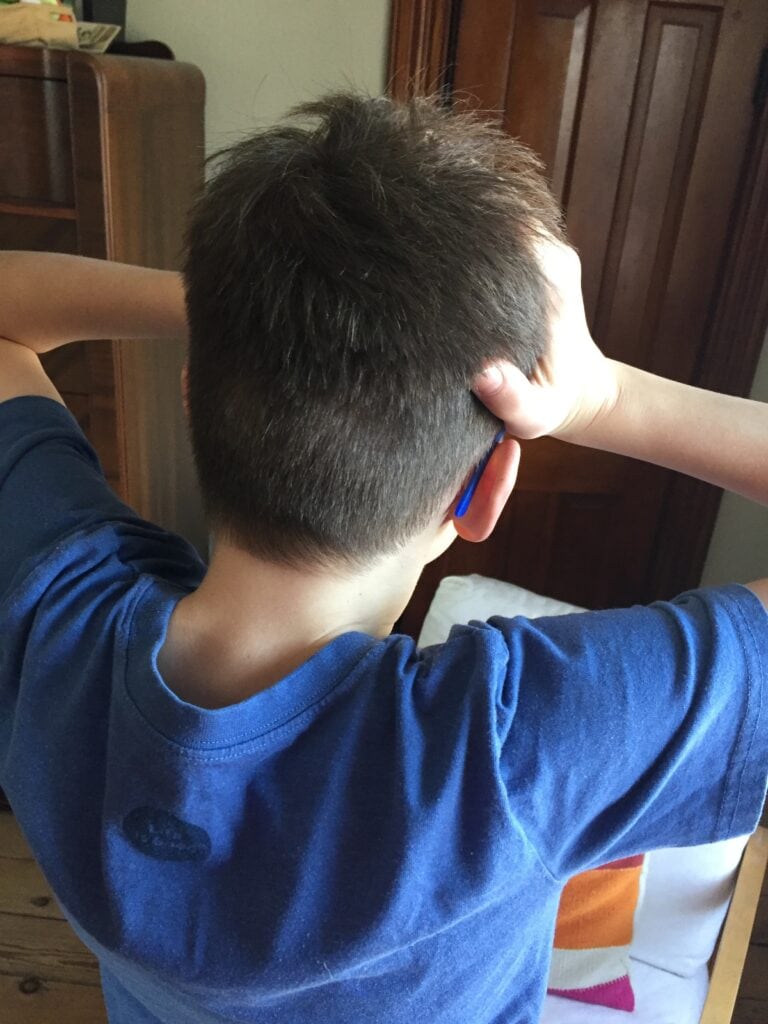
Hey, mama of an explosive kid, I know exactly what you are going thru.
Needless to say, I’ve tried many things to calm my two explosive boys – and wouldn’t you know it, they’re both helped by different things. So, over the years, I’ve built up a pretty great tool box, full of lots of calming techniques.
Yes, I have not one, but two explosive kids. Both of my boys have the same ADHD diagnosis and yet, their explosions can be rooted in completely different things.
I love sharing ways to help calm an explosive child and even prevent the explosions from happening in the first place. I know how heart wrenching and difficult it can be to deal with your child’s explosive behavior.
Related: The Best Book to read if you have an explosive child!
How Do You Calm an Explosive Child?
Every kid is different, so read through all of these options to find one or two that speak to you.
#1 Take yourself out of the equation
A huge part of your child’s ability to regain calm is wrapped up in YOUR ability to stay calm in the first place.
Our children feel safe with us and so we are often in the line of fire when it comes to an explosion. The last thing they need is for us to ramp up, right up along side them.
This is not easy. I work on keeping my cool with every explosion my sons have.
But remember, we are modeling behavior at every moment. As parents we can be so easily triggered by our kids emotions.
But this is the learning. Some of us are already really good at this.
I was not one of those people.
My son’s big emotions could send me to tears or yelling , making his explosion even bigger.
It took me awhile to learn, but I am so much more aware that my sons’ mean words or undesirable actions are all a symptom of his fears and anxiety. They may be directed at me or said in my presence, but they have absolutely nothing to do with me.
Just that realization on it’s own makes it so much easier for me to come at an explosive situation with calm and loving understanding, which serves us all better.
If I sense an explosion coming on – or even as it’s just begun, I make sure my son is safe, and I often leave the room or send him to his designated calming area(more on that below) so we both can be in a neutral space until the storm passes.
I often have to literally take myself physically out of the room and be clear of my son, so we can both calm down.
I’ll say a few words to him to let him know I am close and available when he is ready to talk about what is bothering him, so we can problem solve it together.
You must never, never take a child’ explosion as a personal affront. There is a cause behind it and most likely it has nothing to do with you.
Related: Our ADHD Story, Part ONE
#2 Look at Your Child with a New Lens
Let’s get some perspective.
Your child is not giving you a hard time, he is having a hard time.
This idea brought me a lot of relief when I first heard it – and it made so much sense.
Kids want to behave, they want you to approve of them.
Kids do not want to be in trouble.
They are acting out for all sorts of reasons, none of which are to just piss you off.
Their behavior is more often than not something they have little control over in the moment.
I cringe when I hear teachers or parents (or myself!) say, “Well thats their choice” or “Let’s make a better choice.”
More than likely the answer is not that easy.
Explosive behavior is caused by a lagging skill or unsolved problem (Thanks Ross Greene)
This idea is not mainstream and it may take some real work to get friends, relatives, teachers, school administrators, and, heck, even therapists! on the same page as you.
Related: How I Learned How to Parent my ADHD Child
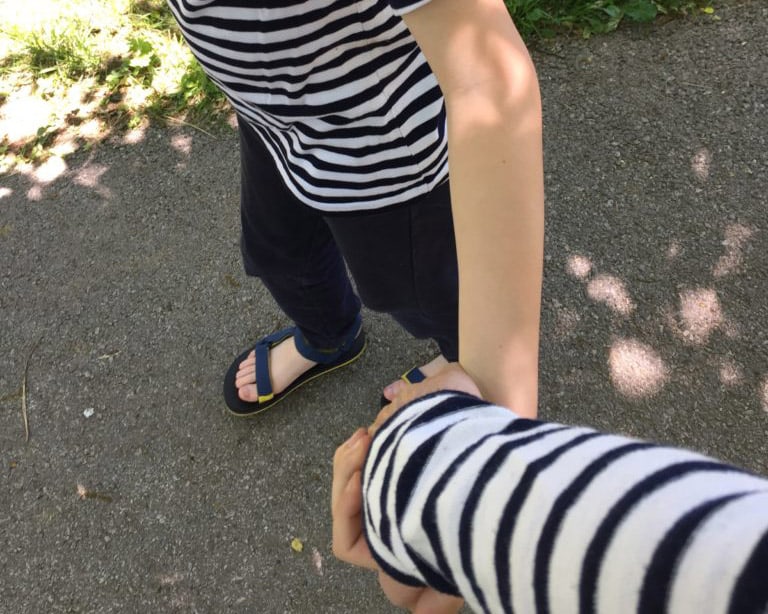
#3 Envision Your Child at Their Best
Envisioning your child at their best is hardly an easy task when they seem to be at their worst!
But, according to Kim John Payne(I am HUGE fan of his work), this is exactly the right moment for you to do it.
Payne’s newest book, How to Be at Your Best When Your Kids Are at Their Worst, is dynamite for teaching you this parenting technique(and for giving you the whole backstory on practical compassion in parenting)
In a nutshell, practice thinking of a golden moment – a positive memory of your child that fills you with warmth. It can be fairly current or it’s okay if was years ago! Play thru all aspects of that moment, in your head – how your child looked and acted, how you felt.
Let pure joy rush over you.
Next, think of your child during an explosive moment – going over all the details in your head.
Now we’ll bring the two moments together with a little breath work.
On your in breath, hold a picture of them in their explosive, troubled state and then breathe out whilst thinking of the golden moment.
Again, breathe in and hold them close in their explosive state. Then breathe out the image of their most wonderful selves into the world.
Essentially this technique allows you to bring your child in close to help during an explosion and then let that wonderful moment, with your child at their best, out into the world, filling the space with only positive thoughts of your child.
The key is to practice this when you don’t need it, so that in those moments where your kiddo is acting less than stellar, you can do a little breathing and imagine this scenario.
I am telling you to try it! Even if you think it sounds a little “woo woo”. The technique is something I am still working on, but have had wonderful results.
The very first time I put it into practice was during a car ride when my son was really fired up. I did about two round of the breathing and imagining – and you could honestly FEEL THE WHOLE MOOD OF THE CAR mellow out, almost instantly.
If you are interested in exploring more of this idea, Paynes book does an excellent job of explaining it in great detail.
I find that it’s easiest to remember to practice a new technique, if I attach it to something I already do – like when I am at a stop light in the car, or whilst brushing my teeth, folding laundry.
#4 Plan for the Explosive Moment
You probably don’t need a crystal ball to let you know when the explosions will happen.
The hope is that as you work on beefing up your kiddos skills and problem solving capabilities (and yours!) that the explosive moments will decrease.
And they do.
I speak from experience on this front, as we used to have weeks (maybe even months) of daily explosions before school.
Thankfully, with the work we have been doing, those don’t happen anymore.
But new situations are always arising (Hello High School!) and there are always new skills to be learned.
You can’t always control the situation, but your have a lot of control over what you say in the moment.
I’ve got a few scripts that I memorize to use when needed. These help me resist the urge to fuel the fire. A few of them go like this:
- “I can see you are mad now, where can you go to calm down?”
- “Those words hurt, you must be really mad to use those words. How can I help?”
- “I will leave you to calm down, come and get me when you are ready. I’ll be just at the bottom of the stairs, reading.”
- “You need to be on a different floor than your brother right now, until everyone calms down.”
- “I am really hurt and mad, I need some time to cool down”
- “I am not in the right mood, I need some time to cool down before we talk.”
Use one of mine or create your own that feel right to you….but memorize it BEFORE you need to use it.
By naming YOUR feelings, you are modeling an acceptable way to behave and express yourself. You are also giving your child the option to go cool down until you can find a better time to discuss what might be going on.
Sometimes, giving them a choice in the moment, moves them from their fight or flight brain to the thinking part of their brain.
Asking a question, giving them a choice between just two things, can do wonders:
“Do you want to jump on the trampoline or sit on the sofa?”
“Would you like a cold drink or a snack?”
“Would you like to read on the ipad or listen to some music?”
“Do you want to use your markers or pencil for your drawing?”
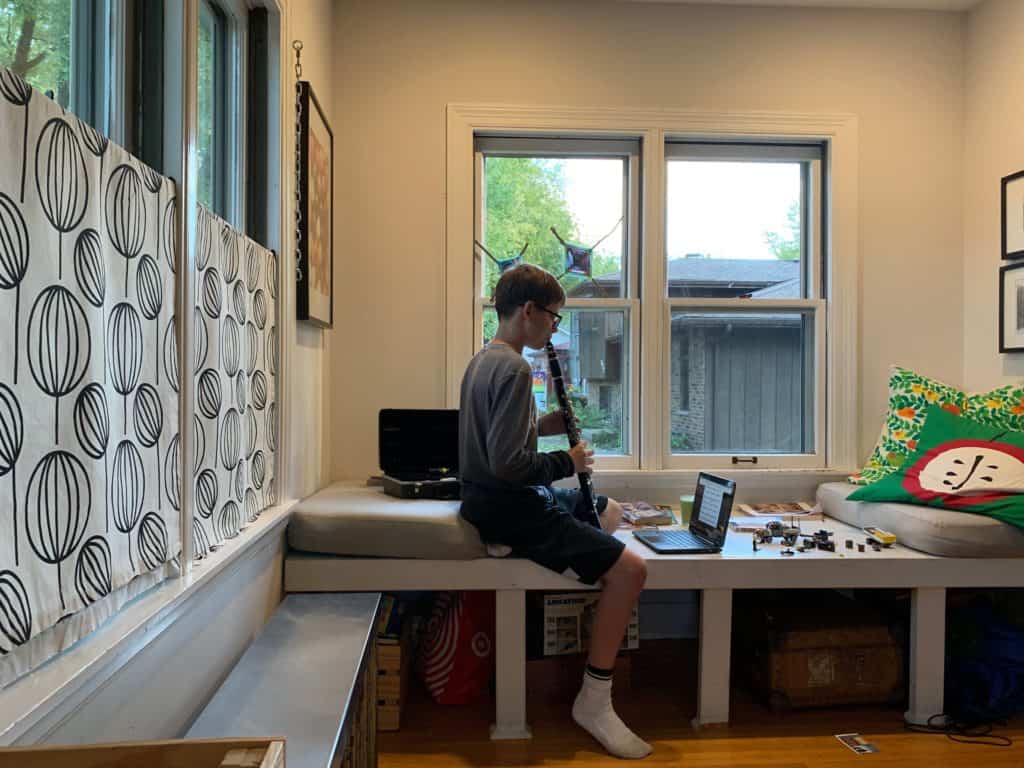
#5 Let it Go
Sometimes the best thing to do is to “let it go” when you hear the first inklings of an explosion. Often it is our interference that makes an explosion ramp up or get worse.
I let some bad behaviors go every day…. sighs, grumbles, a swear word here and there…because a lot of the time, it remedies itself. If I jump in all the time to correct, or calm, it very well may make a bigger deal out of something that otherwise might loose steam very quickly.
Related: Our ADHD Story, Part One
#6 Avoid an Explosion Before it Starts
Being proactive can be an invaluable tool when it come’s to an explosive child.
I know, not exactly something you think you should have to plan for….
But, if we get proactive about your child’s explosions, they may not even have them in the first place.
I don’t mean to make your kids life cushy, with no responsibilities and unlimited screen time and junk food.
You will start to see a pattern with the explosions….do they always happen on a Sunday night? Before family get togethers? Before a band concert?
I often say, the stars must all be aligned for my son NOT to have an explosion. But there are things we have learned to do that really prevent the explosions from happening in the first place.
- We preview the week ahead or even the day ahead if we know an anxiety ridden situation is approaching. (tests, band performances, holidays) Talking over what is going to happen and answering my son’s questions beforehand helps allay his fears and stop an explosion before it even starts.
- I make sure my son gets consistent, quality sleep, eats good food and gets lots of exercise. For my son, these things have a huge affect on his ability to cope with stressful situations.
- We uncover my son’s lagging skills with a therapist and work to build his skills. Finding a therapist who is trained in collaborative problem solving has been a key part of calming my sons’ explosions.
- We talk about ways to help his anxiety around certain situations that cause him the most stress. Math tests give my son a fright, so we got a tutor to build his skills and make him more confident. My son gets anxious before band concerts. So, we work to get him prepared weeks before the event.
Start to notice when the explosions happen – even write them down, if you need to. Surely, you will see patterns and that’s a great first step!
Related: ADHD Parenting Tips
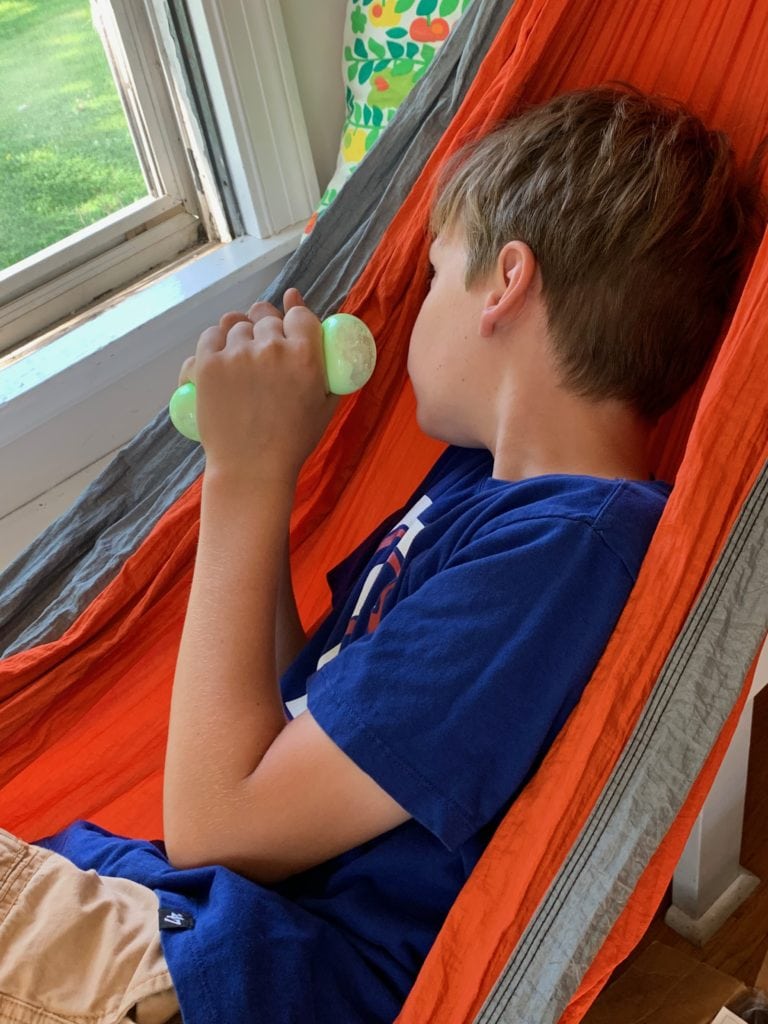
#7 Create a Calming Area
This is key and has really helped us over the years. My kids’ calming areas have changed with the years and the seasons, but we always have someplace for them to retreat to, if needed.
There are a few ways you can create a calming area – you probably already have what you need at home!
- Ask your child what makes them feel better. Don’t assume you know what kind of a space will feel right for your kids. Create a space together using pillows, cushions, a bean bag chair or swing. Maybe its as easy as a weighted stuffed pal and a spot on the sofa.
- Determine if the space is near or away from people. I like to be alone, my son still loves to be close to people, even when he is angry, so we’ve created his spots accordingly.
- Be a detective and notice where they go or what they do when they are anxious or frightened. Both of my kids, like small tight spots, so we have a hammock hung up inside at all times!
- Keep books or an Ipod with headphones ready for when they need it. Maybe a book light and a spot on the coat closet floor would be comforting.
- Don’t be limited by INSIDE your house. Forts, tents, trampolines(jumping on top or sitting below it) are
I noticed that my son likes small spaces to help cam him down. We have a hammock up a lot of the year, he uses his weighted blanket, and has a spot in the corner of the sofa right under the reading lamp he loves to retreat to.
The Book That Says It All
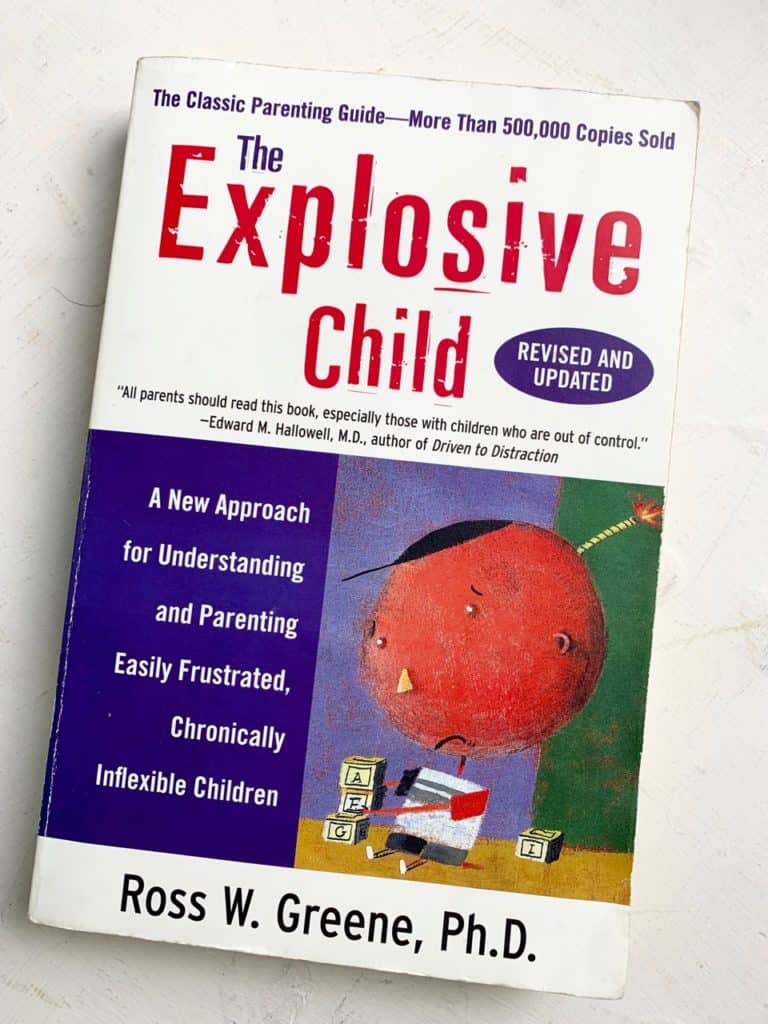
If you have an explosive child and have not read The Explosive Child, by Ross Greene, you owe it to yourself – and your kiddo – to pick up a copy. It is, hands down, in my top three parenting books of all times.
The ideas in the book were new to me when I picked up a copy about 5 years ago and they have forever change who I am as a parent and a teacher.
Let me know which idea from the article you are going to try first!
Follow me on Instagram for our daily goings on.
If you like what you read, don’t miss my weekly dose of ADHD Parenting advice in my newsletter. Subscribe HERE.
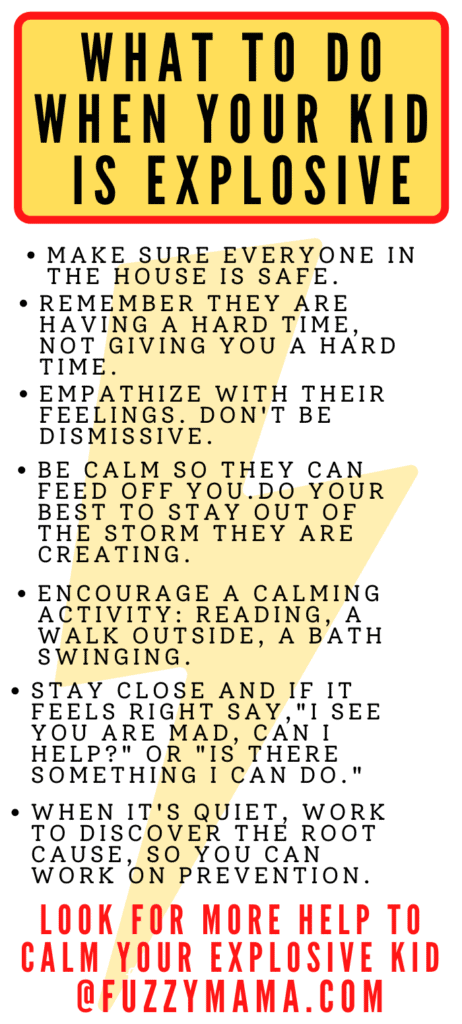

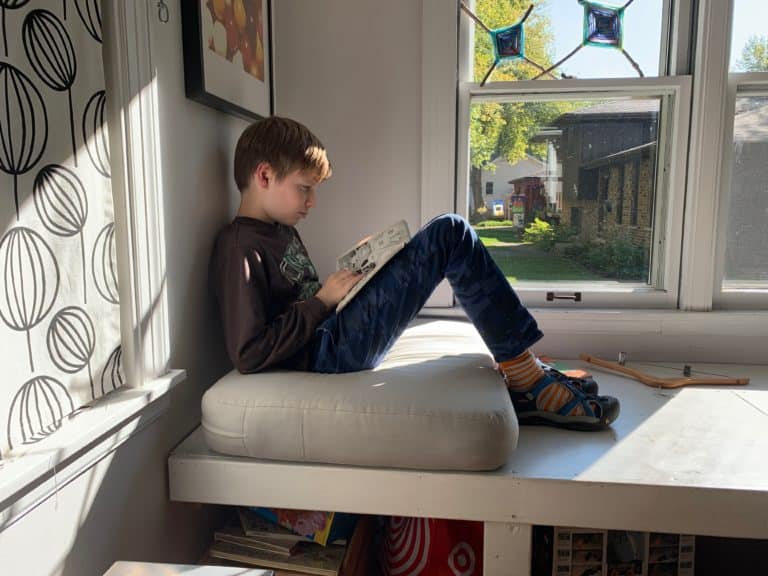

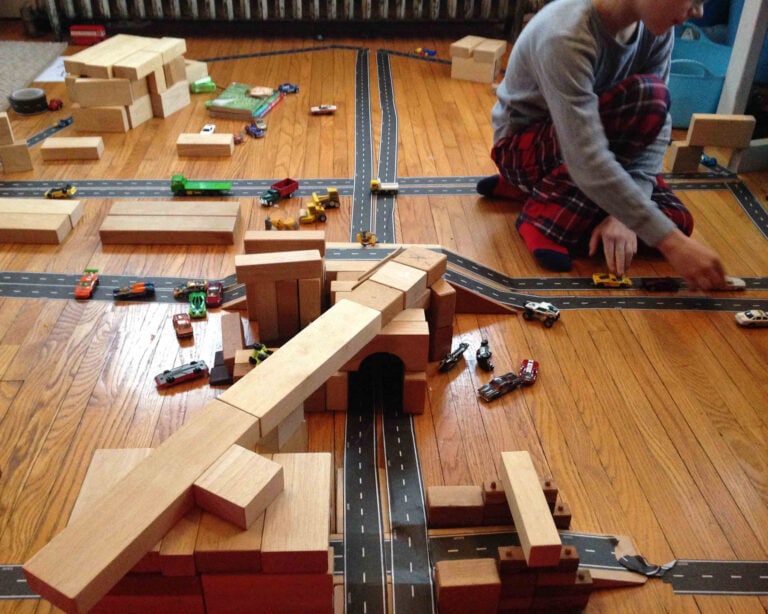

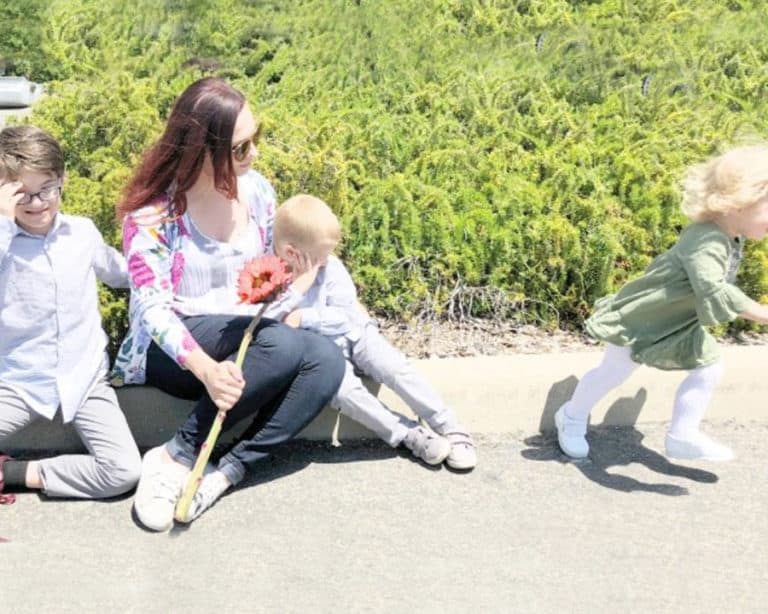
O mg my son has been having a lot if explosions he has adhd…and boy ive been having soo much problems because new teacher dont reads his ip andso she thinks he is bad and she called c ps on me just because my son cant stay still and has explosions and he likes to play all the time with his friendour neigbor so she said i was being negligent
So sorry to hear this! Have you read The Explosive Child by Ross Greene? So invaluable! The Lives in the Balance Website also has lots of resources for teachers and how to talk to them about your child.
I just discovered your blog through a Pinterest post yesterday and I think I’ve read more useful information in the last 24 hours than the last 4 years of parenting my son with ADHD.
I just want to say thank you!
HI Ali!! So glad you found us, please let me know how I can help.
I hope you’re a real person so you see this and know how much you have helped me and my son. We have been struggling with the explosive outbursts trying so many different methods and your blogs have allowed us to connect with him again. Thank you!
So happy to hear this!! That means the world to us. We are real people here. : )